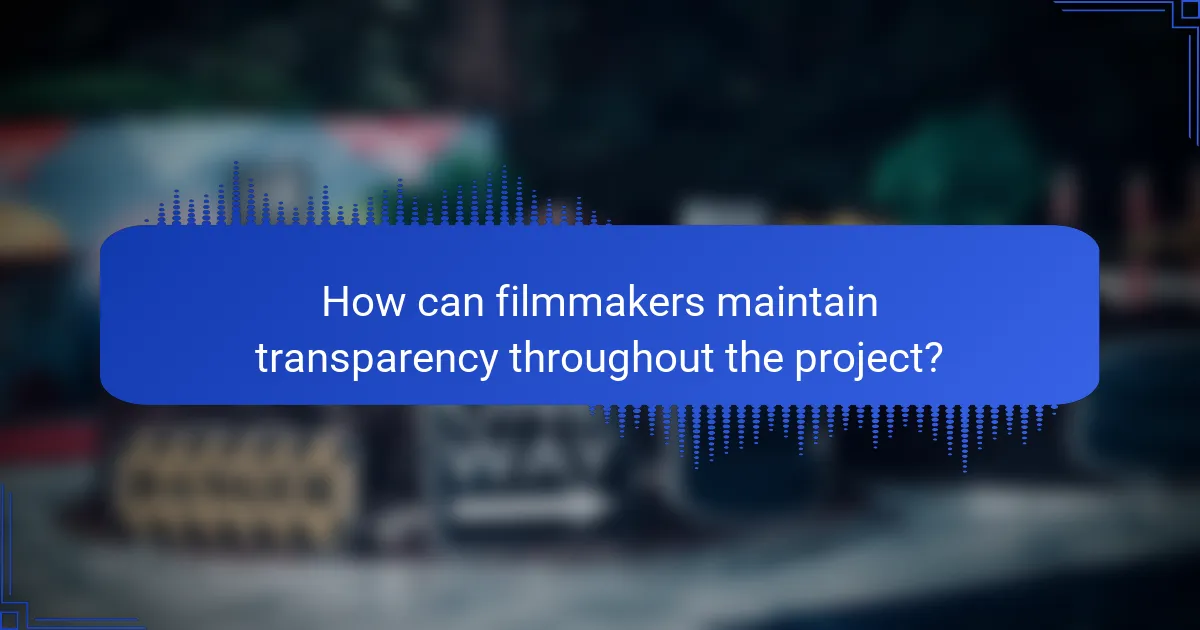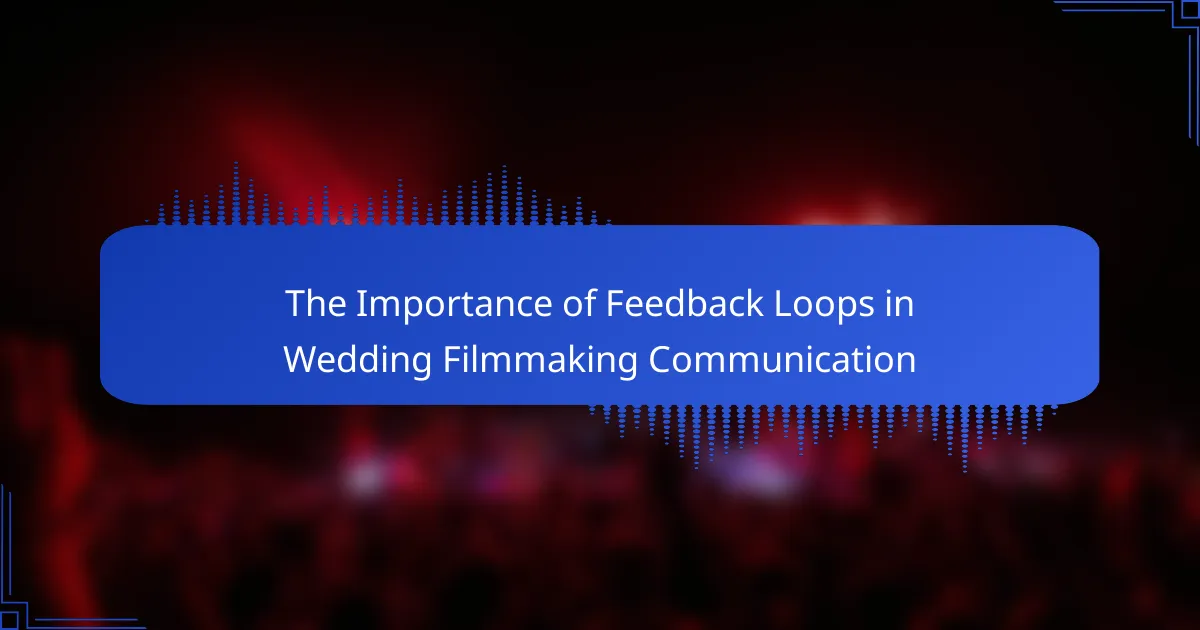Transparent wedding filmmaking is a process focused on honesty and clear communication between filmmakers and clients. This approach involves several steps, including initial consultations, contract signing, pre-wedding planning, filming, and post-production reviews, all aimed at fostering trust and ensuring client satisfaction. By maintaining transparency throughout the project, filmmakers can provide regular updates, share timelines, and invite client feedback, which enhances collaboration and strengthens relationships. The article outlines how these practices contribute to a positive wedding experience and improve overall satisfaction in creative services.

What is Transparent Wedding Filmmaking?
Transparent wedding filmmaking is a process that emphasizes honesty and openness in capturing wedding events. This approach involves clear communication between filmmakers and clients regarding filming techniques, expectations, and deliverables. Filmmakers share their creative vision and obtain consent from clients for specific shots. This transparency fosters trust and ensures clients feel comfortable during the filming process. Studies show that clear communication improves client satisfaction in creative services. Transparent practices can lead to stronger relationships between filmmakers and couples, enhancing the overall wedding experience.
How does transparent wedding filmmaking build trust with clients?
Transparent wedding filmmaking builds trust with clients by showcasing the creative process openly. This approach allows clients to see how their story is crafted. Clients appreciate knowing what to expect at each stage. Transparency minimizes surprises and aligns expectations. It fosters a collaborative atmosphere between filmmakers and clients. Open communication enhances the relationship, making clients feel valued. When clients are informed, they are more likely to feel secure in their choice of filmmaker. Studies show that transparency in service industries increases customer satisfaction and loyalty.
What are the key elements of transparency in the filmmaking process?
Key elements of transparency in the filmmaking process include clear communication, open budgeting, and honest feedback. Clear communication ensures that all parties understand the project’s vision and expectations. Open budgeting allows clients to see how funds are allocated, fostering trust. Honest feedback during the project helps address concerns and improves collaboration. These elements contribute to a more trustworthy relationship between filmmakers and clients. Transparency leads to higher client satisfaction and loyalty in the filmmaking industry.
How does communication play a role in transparency?
Communication fosters transparency by ensuring clear and open dialogue. It allows all parties to share information effectively. This exchange builds trust between clients and filmmakers. Regular updates keep clients informed about project progress. Clear explanations of processes demystify filmmaking. Transparency in communication reduces misunderstandings. It encourages feedback, enabling adjustments based on client preferences. Overall, effective communication is essential for maintaining transparency in wedding filmmaking.
Why is trust important in wedding filmmaking?
Trust is crucial in wedding filmmaking because it fosters a strong relationship between filmmakers and clients. Clients rely on filmmakers to capture their special day authentically. This reliance requires filmmakers to be transparent and communicative throughout the process. Trust ensures clients feel confident in the filmmaker’s ability to deliver high-quality work. According to a survey by WeddingWire, 80% of couples believe trust in their vendors is essential for a successful wedding experience. When clients trust their filmmakers, they are more likely to share personal stories and preferences. This collaboration leads to a more tailored and meaningful final product. Ultimately, trust enhances client satisfaction and promotes positive referrals in the wedding industry.
What are the potential consequences of a lack of trust?
A lack of trust can lead to significant negative consequences. Clients may feel hesitant to share their preferences or concerns. This can result in miscommunication and unmet expectations. The overall satisfaction with the wedding film may decline. Additionally, a lack of trust can damage the long-term relationship between clients and filmmakers. Trust issues can lead to negative reviews and poor word-of-mouth referrals. Ultimately, this can impact the filmmaker’s reputation and future business opportunities. Trust is essential for collaboration and successful outcomes in wedding filmmaking.
How can trust enhance client satisfaction and referrals?
Trust enhances client satisfaction and referrals by fostering a sense of security and reliability. When clients trust a service provider, they feel confident in the quality of the work. This confidence leads to higher satisfaction levels. Satisfied clients are more likely to recommend the service to others. According to a study by the American Express Global Customer Service Barometer, 70% of consumers are willing to spend more with a trusted company. Trust reduces perceived risk, making clients more comfortable with their decisions. This comfort translates into positive word-of-mouth referrals. Ultimately, trust creates a strong foundation for long-term client relationships.

What are the steps in a transparent wedding filmmaking process?
The steps in a transparent wedding filmmaking process include initial consultation, contract signing, pre-wedding planning, filming, and post-production review. During the initial consultation, filmmakers discuss client expectations and vision. Contract signing formalizes the agreement and outlines services. Pre-wedding planning involves scouting locations and creating a shot list. Filming captures the event with attention to detail and client preferences. Post-production review allows clients to provide feedback on the final edit. Each step fosters communication and builds trust between filmmakers and clients.
How can initial consultations foster transparency?
Initial consultations can foster transparency by establishing clear communication between clients and filmmakers. During these meetings, filmmakers can outline their processes, expectations, and pricing structures. This openness allows clients to voice their concerns and ask questions. By addressing these inquiries, filmmakers can build trust and reduce misunderstandings. Additionally, sharing previous work and testimonials during consultations can enhance credibility. Overall, initial consultations create a foundation for a transparent relationship, leading to more successful collaborations.
What questions should clients ask during the consultation?
Clients should ask about the filmmaker’s experience and style. Understanding the filmmaker’s background helps gauge their expertise. Clients should inquire about the packages offered and what each includes. This ensures clarity on services provided. Asking about the filming process is crucial for understanding how the day will unfold. Clients should also discuss the timeline for receiving the final product. Knowing the expected delivery time helps manage expectations. Clients should ask about the equipment used for filming. High-quality equipment can impact the final product’s quality. Additionally, clients should inquire about the filmmaker’s approach to capturing moments. This reveals their artistic vision and alignment with the client’s preferences. Lastly, clients should discuss any additional fees that may arise. Transparency about costs prevents surprises later on.
How can filmmakers present their process clearly?
Filmmakers can present their process clearly by using detailed documentation and visual aids. This includes creating storyboards to outline scenes and shot lists for organization. Filmmakers should also maintain open communication with clients throughout the project. Regular updates can help clients understand progress and decision-making. Additionally, sharing behind-the-scenes footage can provide insight into the filmmaking process. Transparency in discussing timelines and budgets is crucial. According to a study by the International Journal of Film and Media Arts, clear communication enhances client satisfaction. This approach builds trust and ensures clients feel involved in the creative process.
What role does contract clarity play in building trust?
Contract clarity plays a crucial role in building trust between wedding filmmakers and clients. Clear contracts outline expectations, responsibilities, and deliverables. This transparency reduces misunderstandings and fosters open communication. Clients feel more secure when they understand the terms of the agreement. A study by the American Bar Association found that clear contracts lead to higher satisfaction rates in client relationships. When clients trust the process, they are more likely to refer others. Therefore, contract clarity is essential for establishing a trusting relationship in wedding filmmaking.
What essential elements should be included in a wedding filmmaking contract?
A wedding filmmaking contract should include specific essential elements to ensure clarity and protection for both parties. Key elements include the names of both the client and the filmmaker. The contract must specify the date and location of the wedding. It should outline the services provided, such as filming duration and deliverables. Payment terms must be clearly stated, including the total cost and deposit requirements. Cancellation and refund policies are essential to protect both parties. The contract should also address copyright and usage rights of the footage. Finally, a clause for liability and insurance coverage is important for risk management. These elements create a comprehensive agreement that fosters trust and transparency in the wedding filmmaking process.
How can filmmakers ensure clients understand the contract terms?
Filmmakers can ensure clients understand the contract terms by using clear language and avoiding jargon. Contracts should be written in simple, straightforward terms. Filmmakers should also provide a detailed explanation of each section during the contract review process. This allows clients to ask questions and seek clarification. Visual aids can be helpful in illustrating complex concepts. Additionally, filmmakers should summarize key points at the end of the discussion. This reinforces understanding and retention of important details. Following these practices fosters transparency and builds trust between filmmakers and clients.

How can filmmakers maintain transparency throughout the project?
Filmmakers can maintain transparency throughout the project by establishing clear communication. Regular updates on progress help clients stay informed. Sharing the project timeline reinforces accountability. Providing detailed budgets prevents misunderstandings about costs. Inviting clients to review drafts fosters collaboration and trust. Documenting decisions and changes creates a clear record. Using project management tools can enhance visibility into workflows. These practices have been shown to improve client satisfaction and trust in filmmaking projects.
What are effective communication strategies during the filmmaking process?
Effective communication strategies during the filmmaking process include regular updates, clear messaging, and active listening. Filmmakers should provide consistent project updates to keep all stakeholders informed. This transparency fosters trust and collaboration. Clear messaging ensures that all team members understand their roles and responsibilities. Active listening allows filmmakers to address concerns and feedback effectively. Utilizing tools like project management software can streamline communication. Regular check-ins can help identify issues early. Establishing a feedback loop encourages open dialogue. These strategies enhance teamwork and project outcomes.
How often should filmmakers update clients on progress?
Filmmakers should update clients on progress at least once a week during production. Regular updates keep clients informed and engaged. Weekly communication helps manage expectations and builds trust. It allows filmmakers to address any concerns promptly. Consistent updates can include sharing video drafts or production milestones. This frequency aligns with industry best practices for client communication. Additionally, studies show that regular updates enhance client satisfaction and project outcomes.
What tools can filmmakers use to facilitate communication?
Filmmakers can use various tools to facilitate communication. Project management software like Trello or Asana helps organize tasks and timelines. Video conferencing platforms such as Zoom enable real-time discussions. Messaging apps like Slack support quick communication among team members. File-sharing services like Google Drive allow easy access to documents and footage. Feedback tools such as Frame.io enable clients to review and comment on videos. These tools streamline collaboration and enhance clarity in the filmmaking process.
How can filmmakers handle client feedback transparently?
Filmmakers can handle client feedback transparently by establishing open communication channels. Regular check-ins allow clients to voice their opinions throughout the project. Filmmakers should actively listen to client concerns and validate their feelings. Providing clear timelines for feedback implementation enhances transparency. Sharing progress updates keeps clients informed about the project status. Documenting feedback and responses creates a record of discussions. Inviting clients to review drafts fosters collaboration and trust. This approach aligns with industry best practices for client relations, ensuring satisfaction and clarity.
What are best practices for receiving and implementing feedback?
Best practices for receiving and implementing feedback include actively listening to the feedback given. This means paying full attention and not interrupting the speaker. Clarifying any points of confusion can enhance understanding. Asking open-ended questions encourages more detailed responses. Documenting the feedback ensures that it can be referenced later. Prioritizing feedback based on its relevance and impact is crucial for effective implementation. Creating an action plan to address the feedback helps in organizing the tasks. Finally, following up with the person who provided feedback shows appreciation and commitment to improvement. These practices foster a collaborative environment and enhance trust in professional relationships.
How can filmmakers address concerns or issues that arise?
Filmmakers can address concerns or issues that arise by maintaining open communication with clients. They should actively listen to client feedback and concerns throughout the filmmaking process. Providing regular updates can help reassure clients about the progress of their project. Filmmakers can also clarify expectations upfront to avoid misunderstandings. Transparency about the creative process builds trust and confidence. Offering solutions to any issues that emerge demonstrates professionalism. Additionally, seeking client input during key decision points fosters collaboration. Finally, addressing concerns promptly can enhance client satisfaction and strengthen relationships.
What are some tips for ensuring transparency in wedding filmmaking?
Communicate openly with clients about the filmmaking process. Discuss the timeline, expectations, and deliverables upfront. Provide clear contracts outlining services and costs. Share sample work to set realistic expectations. Involve clients in key decisions, such as music selection and editing style. Regularly update clients on progress during the project. Encourage feedback throughout the process to ensure alignment. Transparency fosters trust and leads to satisfying outcomes for both filmmakers and clients.
How can filmmakers create an open and honest environment for clients?
Filmmakers can create an open and honest environment for clients by fostering clear communication. They should establish regular check-ins to discuss project updates and address concerns. Providing detailed explanations of the filmmaking process builds transparency. Sharing examples of previous work can set realistic expectations. Encouraging client feedback throughout the project enhances collaboration. Additionally, being upfront about costs and potential challenges cultivates trust. Studies show that transparent communication improves client satisfaction and loyalty. This approach not only strengthens relationships but also leads to better project outcomes.
What resources are available for filmmakers to learn about transparency practices?
Filmmakers can utilize several resources to learn about transparency practices. Online courses on platforms like Coursera and Udemy offer targeted training. Industry webinars frequently cover transparency in filmmaking. Books such as “The Filmmaker’s Handbook” provide in-depth insights into ethical practices. Professional organizations like the International Documentary Association offer guidelines and resources. Networking events and workshops can facilitate discussions on transparency. Additionally, podcasts focused on filmmaking often address ethical considerations. These resources collectively enhance understanding of transparency in the filmmaking process.
The main entity of the article is transparent wedding filmmaking, which focuses on fostering trust and open communication between filmmakers and clients. The article outlines how transparency in the filmmaking process enhances client satisfaction through clear expectations, honest feedback, and collaborative practices. Key elements discussed include the importance of initial consultations, contract clarity, and effective communication strategies throughout the project. Additionally, the article emphasizes the role of trust in achieving successful outcomes and positive referrals in the wedding industry. Overall, it provides actionable insights for filmmakers to maintain transparency and build strong relationships with clients.



